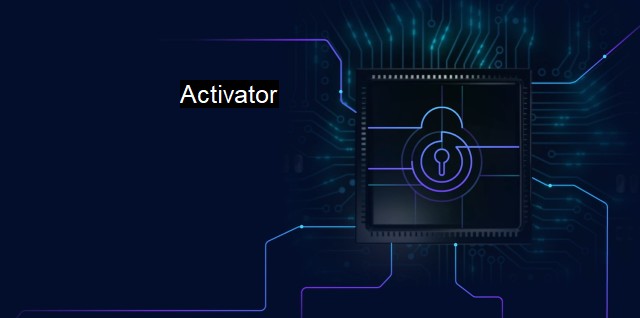What is Activator?
Understanding Activators: An Essential Component in Cybersecurity and Antivirus Technology
In cybersecurity and antivirus contexts, an "activator" is a software program or utility application explicitly designed to “unlock” or “activate” certain software programs, often without paying for the software’s license costs. It's typically utilized in software piracy activities to bypass licensing verifications implemented by software developers. To further elaborate on "activator", one must understand its utilization. While using a software application after downloading or installing, you may encounter a prompt that asks for an activation code or license key. This activation code is a confirmation tool used by developers to verify the software product has been legitimately procured. Here is where activators come into play.Activators can trick the program into believing it's been correctly and formally activated, bypassing the need for a license or activation code. Activators sidestep the conventional route of verification, allowing individuals to use the program indefinitely. These manipulative software tools expose a program’s innards, dissect its activation properties and change these elements to deceive the original activation process. They fundamentally crack the licensing or registration process of the software by directly intervening in the software’s built-in protection system.
While activators seem like an attractive option to paying steep licensing costs, they actually pose a massive threat to system security. Given their illicit nature, activators often function as Trojan horses, hiding potentially destructive malware, which is unknowingly installed onto the user’s computer during the process of activation. This gives hackers an opportunity to infiltrate the system, enabling them to execute varying types of cyber attacks. These include identity theft, data corruption, or theft of sensitive information which can cause significant, if not catastrophic, damage to the user's digital life.
Activators pose a significant threat to computer health. Often embedded with viruses and other harmful malware, activators can slow computers down, delete essential files, or cause other irreversible software damage. This gives rise to other security threats by opening up system vulnerabilities that can be exploited by other malicious software.
Due to the security risks they carry, activators are flagged by antivirus systems as potential threats and are removed or quarantined as a preventive measure. In contrast to common belief, not all antivirus software will have the ability to recognize all sorts of activators. The level of sophistication in some activators makes them stealthy, making it harder for antivirus software to detect or remove them.
Despite their ostensible benefit of saving licensing costs, the use of activators bear significant risks when it comes to cybersecurity. Not only do they cause potential harm by carrying malicious software, but they also promote software piracy which is illegal and unethical.
While on the surface activators may provide a seemingly cost-effective solution, their use can have costly and hazardous consequences. It is more advisable to procure software legally, ensuring the software is safe to use, and contributing to the hard work of software developers. The use of premium, licensed antivirus solutions can also provide a layer of protection against potential threats, including those from activators, underpinning the overall system security and ensuring peace of mind for the user. Functioning as a double-edged sword, an activator can invariably place users and systems under a hefty threat and risk, which is why it’s recommended to abstain from their use altogether. The fields of cybersecurity and antivirus stand united in warning against their utilization, to ensure systems remain safe and uncompromised.

Activator FAQs
What is an activator in cybersecurity and antivirus terms?
In the context of cybersecurity and antivirus, an activator is a tool or program used to activate or crack software, potentially allowing it to bypass licensing requirements or security measures.Are activators safe to use for cybersecurity and antivirus software?
No, activators are not safe to use for cybersecurity and antivirus software. Activators often contain malware or viruses, which can compromise your system's security and leave it vulnerable to attack. It is recommended to purchase licensed software instead of using activators.Can activators be detected by antivirus software?
Yes, many antivirus software programs have features that can detect activators and other potentially harmful tools. Using an activator could trigger a warning or alarm from your antivirus software and potentially cause the software to quarantine or delete the file.Is using an activator considered illegal?
Yes, using an activator to bypass licensing requirements for software is considered illegal and violates copyright laws. Additionally, using an activator can compromise the security of your system, leaving it vulnerable to attack. It is recommended to purchase licensed software to ensure both legality and security.| | A | | | B | | | C | | | D | | | E | | | F | | | G | | | H | | | I | | | J | | | K | | | L | | | M | |
| | N | | | O | | | P | | | Q | | | R | | | S | | | T | | | U | | | V | | | W | | | X | | | Y | | | Z | |
| | 1 | | | 2 | | | 3 | | | 4 | | | 7 | | | 8 | | |||||||